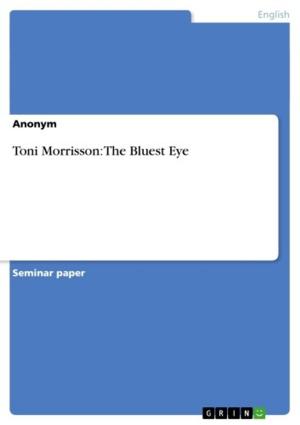Sexuality in Charlotte Brontë's 'Jane Eyre'
Fiction & Literature, Literary Theory & Criticism, British| Author: | Julia Balogh | ISBN: | 9783656003861 |
| Publisher: | GRIN Publishing | Publication: | September 12, 2011 |
| Imprint: | GRIN Publishing | Language: | English |
| Author: | Julia Balogh |
| ISBN: | 9783656003861 |
| Publisher: | GRIN Publishing |
| Publication: | September 12, 2011 |
| Imprint: | GRIN Publishing |
| Language: | English |
Seminar paper from the year 2005 in the subject English Language and Literature Studies - Literature, grade: 2,7, University of Trier, language: English, abstract: Wherever you let your eye travel these days you come across sexuality and nakedness. Three beautiful women are nakedly smiling at you from a huge advertising poster for a solarium, in the advert break on TV a woman tears an attractive man's clothes because she is mesmerized by his new scent, and in the phone book you can even find a voucher which guarantees you a bottle of champagne for free if you book a one hour-service in a certain brothel . Sexuality, and along with it desire and lust are accepted that much that they indeed build the base for a huge manufacturing branch. Of course, this has not always been the case. Sensuality and passion have been fought and punished in earlier times. During the Victorian era for example they have even been seen as dangerous and attacking the mental as well as the physical health. When in 1847 Charlotte Brontë's successful novel Jane Eyre was published, it caused riot and rage because of how the topic 'sexuality' was dealt with. In this paper I am going to explain the Victorian beliefs and notions regarding this topic. Furthermore I am going to reveal the attitude of the characters Jane Eyre, Edward Rochester and Bertha Mason towards sexuality. Before though, I will give a short biography of Charlotte Brontë, to depict how her own attitude differed from the social conventions and expectations of her time.
Seminar paper from the year 2005 in the subject English Language and Literature Studies - Literature, grade: 2,7, University of Trier, language: English, abstract: Wherever you let your eye travel these days you come across sexuality and nakedness. Three beautiful women are nakedly smiling at you from a huge advertising poster for a solarium, in the advert break on TV a woman tears an attractive man's clothes because she is mesmerized by his new scent, and in the phone book you can even find a voucher which guarantees you a bottle of champagne for free if you book a one hour-service in a certain brothel . Sexuality, and along with it desire and lust are accepted that much that they indeed build the base for a huge manufacturing branch. Of course, this has not always been the case. Sensuality and passion have been fought and punished in earlier times. During the Victorian era for example they have even been seen as dangerous and attacking the mental as well as the physical health. When in 1847 Charlotte Brontë's successful novel Jane Eyre was published, it caused riot and rage because of how the topic 'sexuality' was dealt with. In this paper I am going to explain the Victorian beliefs and notions regarding this topic. Furthermore I am going to reveal the attitude of the characters Jane Eyre, Edward Rochester and Bertha Mason towards sexuality. Before though, I will give a short biography of Charlotte Brontë, to depict how her own attitude differed from the social conventions and expectations of her time.















